
Sir David Amess murder – how the papers reported it
“Is it right,” my son-in-law asked, “for one man to dominate the headlines like this? Especially when it could be said that this Government has been responsible for so many thousands of other deaths.”
You’ll have guessed he’s not a journalist. He’s a psychologist, who also happens to be a teacher.
An MP stabbed to death on a routine day’s work trying to help his constituents? At a time when constant abuse, stress and strain for little reward – when compared with possible earnings in the private sector – is putting people off entering politics or, indeed, almost any area of public service? This was an assault not just on an individual, but on our democracy. Of course the killing of Sir David Amess was worthy of all those headlines.
At least on the day the question was posed.
But after four days of the story dominating all the front pages, I began to wonder if he had a point. Not the correlation with the Covid death toll. At its most basic level, Amess wasn’t a member of the government and certainly couldn’t be said to have the blood of 150,000 people on his hands. Not even one of them. He was by almost every measure a good man and it took only a brief explanation of his efforts to raise awareness of endometriosis – a campaign that itself arose from just the sort of constituency surgery that was to cost him his life – to persuade son-in-law that the day one coverage was justified.
That would also have been so had Amess been a teacher or a fireman and definitely if he had been a policeman. Public servants being killed in the course of their duty should be, and thankfully still is, big news.
There’s another driver here, however. Our national newspapers are inextricably caught up in the Westminster bubble and that magnifies the response. When everyone around you is talking about one thing, you can be excused for thinking that’s the only thing anyone anywhere is talking about. And, with Amess, they were – for a few hours. Then most people went back to worrying about other things: Covid, climate, how they were going to heat their homes, who was being kicked off Strictly.
Of course the story was important and of course it developed over the following days with new angles and the Commons tributes, but there was another stabbing death at the weekend that made me question the news values shared almost universally across our print media.
Our national newspapers are inextricably caught up in the Westminster bubble and that magnifies the response.
Under-reported: Glasgow killing
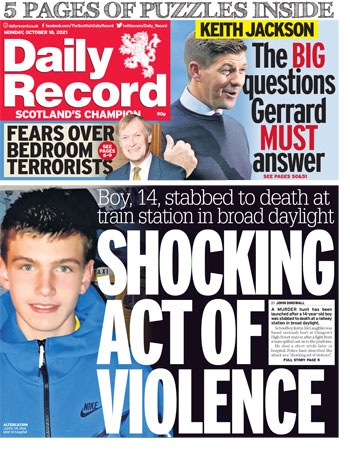
Fourteen-year-old Justin McLaughlin was returning home from a Saturday afternoon outing with friends to Glasgow city centre when he was killed in what police called “a shocking act of violence” at the High Street railway station. There were reports of an “altercation” involving a group of young people on a train that spilled out on to the platform, where Justin was apparently stabbed. A 16-year-old boy has been charged with murder and appeared in court on Tuesday.
British Transport Police are also investigating another incident the previous day when a group of youngsters chased another boy through a train and then attacked him. He is now in hospital.
Justin’s death was the splash in the Daily Record and the Scottish edition of the Sun on Monday. It merited a “proper” story in most of the big regional papers – the Western Mail, Newcastle Press and Journal, Yorkshire Post, Manchester Evening News, Liverpool Echo, Leicester Mercury, Hull Daily Mail and the Welsh Daily Post. The Guardian made it a page lead, but it barely broke 100 words in the English editions of the Sun, Telegraph and Times and it was ignored – or at least confined to Scottish editions – by all the other national dailies.
It’s easy to say, “Oh, it’s gang culture” or “It’s just Scotland” or “It doesn’t have the same implications for society”. But is that right? We don’t know if Justin (or the other boy in hospital) was bound up with gangs or an innocent bystander. But in a way, that’s irrelevant. His life was no less precious than that of a 69-year-old MP; the manner of its loss as indicative of a problem with our society as that of Amess. And Glasgow is just as much a part of our country as Westminster.
Yes, I’m being a bit perverse. I know Amess is the bigger news story and I know a dozen reasons why. But that doesn’t make the disparity between the coverage of these two deaths – 20 pages in the Daily Mail on Amess against one page lead in the Scottish edition and not a word in the main run on Justin – any more palatable.
Jo Cox

My instinct was that coverage of the murder of Jo Cox had been more extensive that than of Sir David Amess. Maybe it was a bigger story because she was the first to die this way, because she was a young woman rather than an older man, because the killing came at the climax of the referendum campaign.
I misremembered. The similarities in the way most titles approached the two killings was striking: in each case, the Telegraph was alone in clearing the front page, apart from nibs (it dropped the puff for Cox but put a trailer over the titlepiece for Amess). Everyone else kept their promotional material, apparently seeing no problem in juxtaposing giveaways, goals and gluttony with the horrors in Southend and Leeds (six had the word FREE somewhere).
The Mail and Mirror were more restrained in this respect when Jo Cox died – they both flagged the latest development in the Cliff Richard abuse saga rather than fripperies. This time they stuck with their special offers – well, it was a Saturday after all – but very much scaled back. The Sun also reduced its puffery on both occasions, limiting it to the top of the page for Cox and column 1 for Amess. The Guardian, surprisingly, kept the full weekend paraphernalia across the top and down the side – but then, nor did it curtail the Friday football for Jo Cox.
The Express and Star both went bigger on Amess than Cox, but here the difference can probably be put down to the change of ownership and editors in the interim.
The i, however, was very much an outlier. When Jo Cox died, it produced a magisterially sober front page that was almost entirely plain white newsprint with a small photograph and two sentences in the centre. This was surrounded by a black border, wider at the left to encompass the titlepiece and pointers to other stories inside. The treatment was a variation on a theme it had developed the previous week, urging readers to engage with the real issues of the referendum, proclaiming “The media won’t decide this vote” and “Business won’t decide the EU vote”.
By comparison, the David Amess front page was a disappointment. A paper that often eschews pictures to make a virtue of a stark black headline and punchy bullet points on a white background inexplicably decided to make a photograph of half a dozen policemen the central element, with the headline “Killed serving the people” superimposed. A cutout of Amess at the bottom seemed almost an afterthought and was so divorced from the main heading that someone who’d just beamed in from Mars might think it was one or more of the officers, rather than the MP, who had died. Nor was the page helped by the handful of beaming showbiz faces in the puff to the left.
Muslim or Christian
Phase two of the news cycle surrounding both killings was the “terrorism” line. And here papers showed their true colours. With Jo Cox, the Guardian, Times, Sun and Mirror quickly homed in on the killer’s links to the “far right”; the Telegraph splashed on general threats to women MPs and the Mail on the gunman’s “mental state” (It was later to suggest that immigration was to blame – that a fear of having migrant neighbours had driven him to murder). The Express, Star and i all went on the human anguish, playing down or ignoring the “Nazi” link. No one made a big thing about Thomas Mair being a white Briton.
This time, everyone jumped on the fact that the man in custody was a “British-born Muslim of Somali descent” to run down the familiar road of Islamic terrorism and radicalisation. This is not to say that questions about the Prevent initiative and deradicalisation programmes are not legitimate, merely to point out that the Press is far more eager to explore the roots of terrorism when the people concerned are Muslims of colour rather than white “Christians”.
No one made a big thing about Thomas Mair being a white Briton.
All social media’s fault?
Then came the inevitable attacks on social media, with Amess’s neighbouring Essex MP Mark Francois leading the charge. He wants the online safety bill going through Parliament to be toughened up and to become “David’s law”. Anonymous trolling should be outlawed, he thinks. Well, yes, we’d all like a friendlier public discourse, but you can pass as many laws as you like and you still you won’t be able to stop people using fake identities on Facebook.
And, yes, things have got uglier in the social media era, but Twitter, Instagram and the rest are hardly the only platforms for this ugliness. Look at some of the headlines in the mainstream media before the referendum and beyond: some might describe publishing the photographs of three judges above the headline “Enemies of the people” as intolerable abuse of public servants doing their job – and while that may have been the most notorious, it was hardly a one-off.
Some of the columnists writing now about threats to politicians might also do well to re-read some of their own words, both in print and on the dreaded social media. Anyone would feel sympathy for Sarah Vine (Michael Gove’s estranged wife), who yesterday described the threats and abuse her family had suffered – but look at the scorn she has poured on Meghan Markle – and others – over the years.
And when it comes to online trolling, how’s this for inciting a Twitter pile-on: “We really need to name and shame the #Boris neighbours. Maybe record their blameless, unshouty lives and give the tape to a national newspaper. Anyone know who they are?” That came courtesy of the Telegraph’s Allison Pearson.
Newspapers are, it seems, to be exempt from the provisions of the online harms bill, so what chance is there that they will stop throwing stones from their steel-reinforced glass empire? None.
Some of the columnists writing now about threats to politicians might also do well to re-read some of their own words.
Contempt laws – there for a reason

The contempt laws are a blessed nuisance for news media that want to share as much information with their readers as possible. Every time you get a big story like Sir David Amess, the Attorney-General has to remind the Press (rarely broadcasters) to stick within the law. Yet the message never seems to get through.
The Sun’s splash headline on Sunday was “MP’s killer on terror alert list”. Killer, not suspect, and not even a quote mark in sight. On Monday, the quote marks made an appearance around the word killer, along with a photograph of the man in custody, but the main headline was still unequivocal: “Twisted by hate preacher”. By Tuesday, the story had been relegated from the splash to a write-off. This time, the headline was “‘Lone wolf’ UK threat worst ever” over a story about MI5’s concern that a large number of terrorism suspects were acting outside of known organisations. Which would have been ok if the intro hadn’t included, “like … the alleged killer of Sir David Amess” and run alongside a photograph of the man in question.
The contempt laws, inconvenient as they are, are there to ensure justice is served. That means not only that the innocent get a fair trial from an unprejudiced jury, but also that the guilty are punished. One of these days, a killer is going to escape that justice because he (it will probably be a man) is able to argue that he could not get a fair trial.
The Sun obviously thinks the man in custody is a bad egg and should be in jail for a very long time. So it’s time it learnt a bit of self-restraint and stopped putting that outcome in danger.
Historic public health failure – did the papers agree?
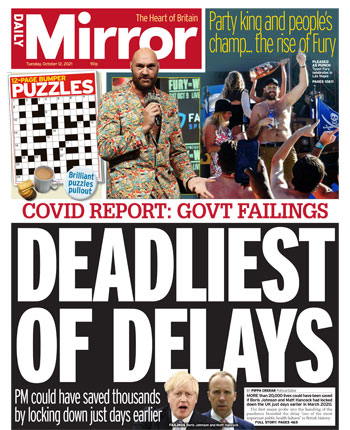
Some 150,000 people have died in this country with Covid. The infection and death rates are rising rapidly and there are as many people in hospital as there were before restrictions were lifted in the summer, posing a real threat to the NHS as winter approaches. People want some answers.
The official inquiry into Britain’s handling of the pandemic has been pushed back to next year, so the best hope we have at the moment is the verdict of the health and science select committees, which conducted a joint inquiry earlier this year. The killer phrase in its report, published last week, was “one of the most important public health failures the United Kingdom has ever experienced”.
Pretty damning.
This line naturally made the splash for the Guardian and, in various paraphrases, for the Mirror, Metro and i.
The Mail focused on the elderly being treated as an “afterthought”, and while it didn’t highlight the “worst ever” criticism (which related to delays in instigating social distancing and lockdowns, about which the paper is sceptical), it pulled no punches with an overline that included “devastating report”, “Government blunders” and “test and trace fiasco”.
The Times preferred a more government-friendly splash on the possibility of state loans for firms hit by gas price rises, but it did run the Covid report as a hamper, with a headline saying Britain must learn from “big mistakes”.
At least it was on the front. The best the Telegraph could manage was a blame-the-scientists nib, while it was nowhere to be seen on page one of the Express or Sun. Or the Star, which was weird, given the hard time the paper has given Boris Johnson and his Cabinet throughout the pandemic – at times seemingly the only paper holding the Government to account.
The Sun came up with a neat headline on its page 2 coverage – “From bad job to good jab” – which was probably the most balanced summary. Because, aside from the heavy criticisms, the report did acknowledge that there were areas where people, most notably vaccine tsar Kate Bingham, had done well.
The committees also threw the Pro-Jo press a lifeline with their criticism of “groupthink” that meant that flawed scientific advice went unchallenged. This provided the angle for the Telegraph’s coverage (a page 8 lead, behind a Tory MP unable to distinguish between Kwasi Kwarteng and Sajid Javid, a bisexual superhero, William Shatner going into space and Sally Rooney’s new book, among other things). It is certainly true that an early government mantra was “We’re following the science”. But at the same time, the scientists were saying “Scientists advise, politicians decide”. The buck is supposed to stop at No 10, not be shifted to some committee room where out-of-their-depth politicos were apparently just doing as they were told (and throwing millions to their friends) instead of taking responsibility and asking intelligent, pertinent questions.
The best the Telegraph could manage was a blame-the-scientists nib, while it was nowhere to be seen on page one of the Express or Sun.
The Express angle
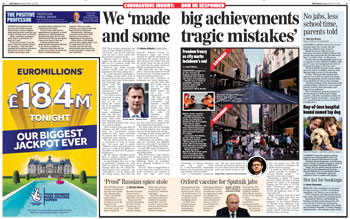
Meanwhile over at the Express, the most pressing issue of the day was the Christmas shop (“Don’t panic! We can fill shelves for Xmas”). There was more of this on the 4-5 spread with the promise of “A merry Christmas still on the cards” overlaid on a photograph of empty supermarket shelves.
This is what you call accentuating the positive. And that’s what the paper did with its Covid report coverage on pages 10 and 11. Under the headline “We made big achievements and some tragic mistakes”, the story began: “The Covid vaccine programme was ‘one of most effective initiatives in UK history’, but the first lockdown came too late, a major inquiry into the pandemic response found.
“Britain's drive to develop and deploy the jabs was world-leading, MPs on the Commons health and science committees concluded. However, they found scientific advisers initially took the wrong approach to the virus, costing lives.”
So Britain is great, scientists let us down. What more is there to say?
Well, just as politicians should have been more questioning, so should journalists. They could, for example, have delved into the lack of preparedness, the shortages of PPE and medical equipment. They could, perhaps, have asked the committee chairmen Greg Clark (science) and Jeremy Hunt (health) about that. Hunt, in particular, should have been in a position to enlarge on these issues. He was, after all, the Secretary of State when stocks were run down and pandemic preparation measures sidelined.
Holiday hobbies
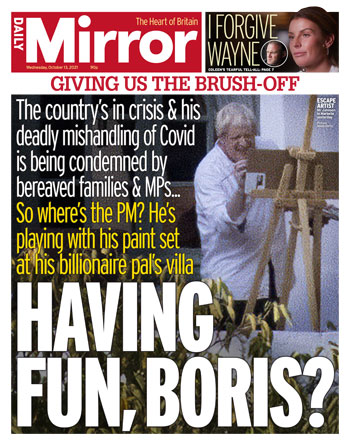
Journalists would also presumably have liked to have asked the Prime Minister what he had to say about this “devastating” judgment on his handling of the situation. But he was on holiday in Marbella. Good timing that on his part.
Boris Johnson’s time in office seems to have been a succession of crises – from getting Brexit done, through the pandemic, via the EU trade negotiations, to the current growing list of shortages – and he has a big climate summit coming up in a couple of weeks. There never seems to be a good time for him to take a break.
It’s true that Johnson is not renowned for his diligence and work ethic. There was that post-election post-Brexit new year holiday in Mustique, the half-term at Chequers spent negotiating a divorce and planning a wedding while the rest of the world was waking up to a frightening new pneumonia in China, that bit of “camping” in Scotland and another foreign jaunt the details of which escape me. But, setting aside the issue of allowing rich friends to pay for your holidays (Tony Blair was happy to accept Silvio Berlusconi’s hospitality and got just as much flak for his trouble), is that excessive? Running a country is hard work, even for the most indolent, so prime ministers need down time (or chillaxing time, as David Cameron would say). And if Johnson needs a break from us, some of us, too, could do with a break from him. There seems to have been no escaping him all summer. So I don’t begrudge him his few days of Spanish sun.
What does concern me, though, is the painting.
This exercised the Mirror and the Star - “Weasel at his easel” was a rather wonderful headline – how could a supposed leader be dabbling with daubing while people were dying and going without a top-up litre or two of petrol? Yet there he was, two days on the trot, squinting at his artistic efforts. Shameless!
But do you ever feel that you’ve been played? Johnson’s Churchillian aspirations are well-known. You couldn’t look at those photographs and not call to mind the old pictures of a besmocked Churchill at his easel. Johnson wasn’t wearing a smock, but the loose shirts – first white, then blue – produced a similar effect. The Mirror tried to make fun of him with a pair of insets headlined “How he sees himself” (Churchill) and “What the nation sees” (a chimp). But that just brought to the surface the subliminal “Johnson as Churchill” message.
It was artifice on the same level as his ramblings about a hobby of painting passengers on buses – which briefly supplanted the big red £350m lie as top Google result for a “Boris Johnson bus” search. He knew the long lenses would be trained on him and he knew how to take advantage of that fact.
Johnson’s right to spend a few private moments relaxing with a paintbrush is unarguable. How those grainy photographs were secured is another matter. It looks to me like prima facie case of intrusion. But the Prime Minister won’t be complaining.
It was artifice on the same level as his ramblings about a hobby of painting passengers on buses.
Saving Christmas

One of the tasks near the top of the Prime Minister’s ever-expanding to-do list is saving Christmas. He had a practice run last year and failed at the final hurdle. Maybe he’ll be luckier this time. As ever, half of our newspapers are on his case and half are on his side. Whichever, they seem preoccupied with this challenge. This seems a little odd to me: last year, “saving Christmas” was about allowing families who had been kept apart for nine months to see each other for a couple of days; this year it’s about the ability to buy a bit of plastic from China or to eat a sausage wrapped in bacon. Do people care as much as the papers suggest?
And if they do, is the Press helping or making matters worse? The same question could be asked of business. When the media reported that BP was rationing petrol at some filling stations, they were accused of stoking panic buying and creating a shortage where there was no real supply problem. It seems to me that is exactly what some toy shops are trying to do here: telling people that if they see it they should buy it because so much plastic is stuck in containers that can’t dock in Felixstowe that if they hesitate, the must-have toy might not be available next month. That smacks more to me of self-interest than concern for the customer.
Perhaps the papers could show an example by quieting down the “save Christmas” narrative and adopting a bit of perspective?
Do people care as much as the papers suggest?
Clarkson’s Farm vs Countryfile
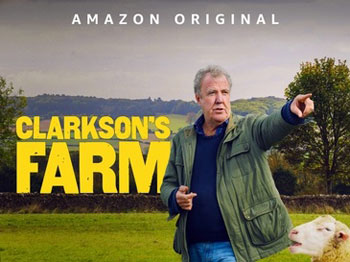
Have you watched Clarkson’s Farm? It’s wonderful television. Even those who can’t abide Jezza are captivated. In an uncharacteristic exercise in self-deprecation, he has shown how difficult it is to grow crops and rear livestock when the weather, the bureaucracy and the pandemic are against you.
For this, the National Farmers’ Union is extremely grateful and this month, it named him “Farming champion of the year”.
The award was announced on Thursday 7th and made it to the national papers two days later – as a nib in the Telegraph and a page lead in the Express. The Sunday Star ran a nib the next day.
Then a farmer stood up at the Cheltenham Literary Festival and said what a good show it was and how it was so much better than the BBC’s Countryfile.
According to James Rebanks – a Cumbrian sheep farmer there to promote his latest book – Countryfile had pissed off farmers for 30 years, "because the whole logic of Countryfile is that they can't make a mainstream programme about farming because farming is for a niche group of idiots.” Clarkson had proved that was wrong.
Rebanks’s remarks were reported in the Times (which sponsors the Cheltenham festival) as a page lead that included this unsourced paragraph: “Countryfile, which first aired on the BBC in 1988, has been dubbed ‘Townfile’ and ‘anti-farming’ by some in the community who suggest that it lacks understanding of, and sympathy for, the difficulties that farmers face.”
So was this story given prominence because of Clarkson’s award, which had gone unnoticed four days earlier, or because of the attack on the BBC? Well, the headline and the bulk of the text suggest the former; a catch-up, perhaps, after an embarrassing miss, given that Clarkson writes weekly columns for the Sunday Times and the Sun – although he modestly refrained from boasting about the prize in either.
But once the “Bash the Beeb” genie was out of the bottle, there was no recorking it.
Max Hastings had another bite in his Notebook the next day, saying that Clarkson was the best voice for the countryside in a generation “because, unlike the BBC’s rural presenters, he surrenders nothing to the soppiness of urban viewers”. Hastings must have missed the tearful episode where two barren sheep had to go to slaughter.
Above Hastings, Melanie Phillips was ploughing a different anti-BBC furrow, in a piece about Ridley Road headlined, “Making a drama out of BBC group-think”.
Meanwhile the Telegraph went one better, devoting its main feature page (and front-page puff) to “Clarkson v Countryfile? No Contest”. Here we had 1,300 words by food writer William Sitwell and farmer Jamie Blackett on why Jezza was always going to be the winner. When you run two pieces by two writers on the same subject, convention is that they take different views. But apparently not when it comes to the BBC. Here, they were of one voice. They just had a different list of BBC failings.
It seems a shame that it has proved impossible to celebrate and laud Clarkson and Amazon for producing original, compelling television without turning it into a complaint about somebody else. And not just anybody else – specifically the BBC. I haven’t noticed anyone carping about the absence of farming programmes on ITV or Sky.
Still, for all the 30 years of pissed-offness, Countryfile must have done something right in the eyes of the farming community. Its presenter Adam Henson was also named Farming Champion of the Year once (in 2010). Funny none of last week’s stories mentioned that.
But once the “Bash the Beeb” genie was out of the bottle, there was no recorking it.
Didn’t we do well
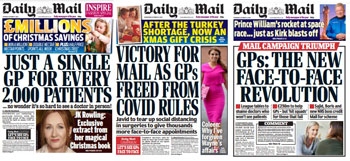
Ask any trainee reporter what they want to do as their print career progresses and the answer is likely to be one of three things: foreign correspondent, investigations or campaigning. And if there’s one paper that likes to think of itself as The Campaigning Newspaper, it is the Mail. Sometimes its objectives are honourable, sometimes they are cynical. But it is certainly effective. I guess with so many campaigns on the go, it is bound to have more successes than most.
The latest one has been to force GPs to see patients in their surgeries, rather than over Zoom. Whether this is a legitimate target depends on where you stand. The Mail (as has been noted here before) seems to regard many family doctors as workshy. GPs meanwhile feel under siege and under-appreciated. They think that video and phone appointments work both for themselves and, more importantly, for many patients.
But when the Mail speaks, Conservative governments listen. So it was that Sajid Javid last week announced that £250m would be made available to facilitate these in-person consultations. This isn’t extra money; it will come from the pot already allocated to the NHS. How far the money will go is another question, since – rather like foreign lorry drivers – if the locums aren’t there to fill in the gaps, it doesn’t much matter how many £50 notes you wave around. And the Mail damaged its own argument with its splash on Monday of last week “Just a single GP for every 2,000 patients”. This wasn’t an artificial figure, as the one we spoke about last time was. It was a demonstration of the decline in the number of doctors going into general practice while the population is expanding.
But, never mind such minor details, two days later, the paper was splashing on “Victory for the Mail as GPs freed from Covid rules”. This was followed the next day with, “GPs: the new face-to-face revolution” with the white-on-red overline “Mail campaign triumph”.
Whatever happened to that Great British reserve and modesty?
Here’s a tip for those wannabe journalists just starting out: campaigns are about the issue, not about you. If they succeed, the triumph is the cause’s, not yours. To make yourself the central point of the splash, as the Mail did last Wednesday, is naff in the extreme.
Here’s a tip for those wannabe journalists just starting out: campaigns are about the issue, not about you. If they succeed, the triumph is the cause’s, not yours.
Front page of the fortnight

I was tempted to go for the Mirror on Johnson’s painting, but have instead plumped for a series of pages. There’s nothing particularly spectacular about them, but, as noted above, there was a refreshing newsiness about the Daily and Sunday Express’s Amess covers. A pleasing deviation from the usual Johnson adulation and “everything’s wonderful” output.
Liz Gerard’s Notebook is a fortnightly column published in the InPubWeekly newsletter. To be added to the mailing list, enter your email address here.












